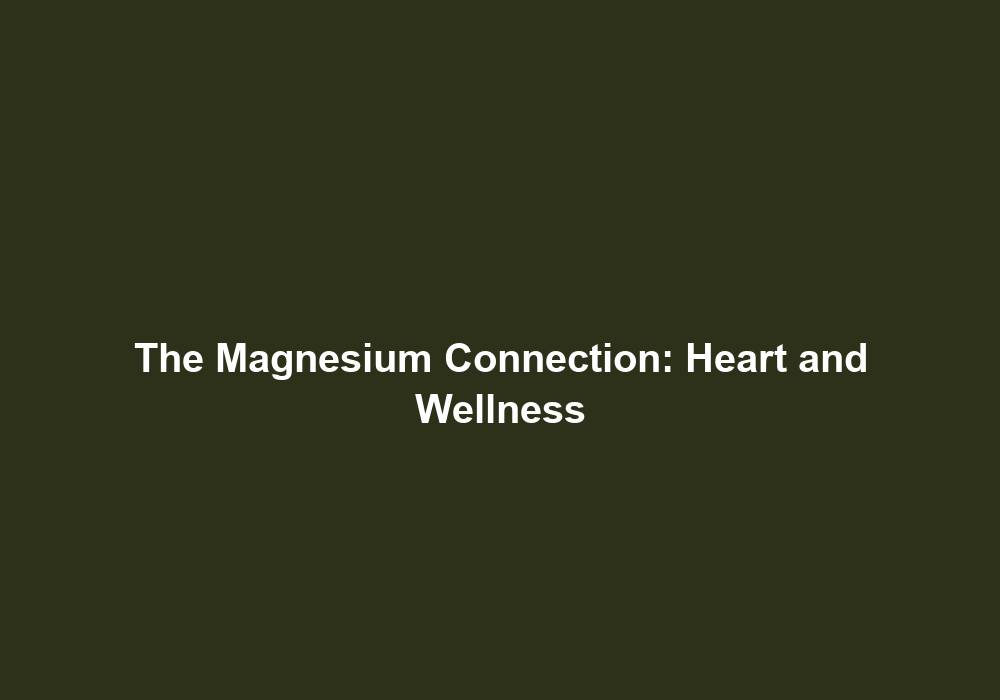The Magnesium Connection: Heart and Wellness
Magnesium is an essential mineral that plays a crucial role in maintaining heart health and overall wellness. It is involved in numerous biochemical reactions that directly impact cardiovascular function, muscle contraction, nerve transmission, and energy production. In this article, we will delve into the importance of magnesium for heart health and explore its connection to overall well-being.
Understanding the Role of Magnesium in the Body
Magnesium, the fourth most abundant mineral in the human body, is required for the proper functioning of hundreds of enzymatic reactions. Acting as a cofactor in these reactions, magnesium facilitates various metabolic processes that contribute to overall well-being. When it comes to heart health, magnesium plays a particularly vital role in maintaining normal heart rhythm, regulating blood pressure, and preventing the development of cardiovascular diseases.
Maintaining Normal Heart Rhythm
One of the key functions of magnesium in the cardiovascular system is its involvement in maintaining normal heart rhythm. The mineral helps regulate the electrical impulses that coordinate the contraction and relaxation of the heart muscles. By ensuring the heart beats in a steady rhythm, magnesium prevents any irregularities or abnormalities in the heart’s electrical signaling.
Regulating Blood Pressure
Magnesium also contributes to the regulation of blood pressure levels. It aids in the relaxation of smooth muscles within the blood vessels, allowing them to widen and promote healthy blood flow. By reducing resistance in the blood vessels, magnesium assists in maintaining optimal blood pressure and reducing the risk of hypertension. High blood pressure is a significant risk factor for heart disease and stroke, making magnesium intake crucial for cardiovascular health.
Preventing Cardiovascular Diseases
Adequate magnesium levels have been associated with a reduced risk of various cardiovascular diseases. Research suggests that maintaining optimal magnesium intake can lower the risk of developing conditions such as coronary artery disease, arrhythmias, and even heart attacks. Magnesium’s anti-inflammatory properties also contribute to its protective effects on the cardiovascular system, as chronic inflammation is a significant contributor to heart disease.
The Link Between Magnesium and Overall Wellness
In addition to its role in heart health, magnesium also plays a vital role in overall wellness. Its benefits extend beyond cardiovascular function and impact various systems and processes within the body.
Muscle Health and Function
Magnesium is essential for proper muscle function and plays a crucial role in muscle relaxation. It aids in the contraction and relaxation of muscles, including those involved in heartbeats. Adequate magnesium levels contribute to improved muscle strength, endurance, and overall physical performance.
Nervous System Support
The nervous system relies on magnesium for optimal function. This mineral helps regulate neurotransmitter release, which is vital for smooth nerve transmission. Adequate magnesium levels promote healthy nerve function, aiding in the prevention of conditions such as migraines, muscle cramps, and even mood disorders.
Energy Production
Magnesium is involved in the production and utilization of adenosine triphosphate (ATP), the body’s primary source of energy. It plays a crucial role in the metabolism of carbohydrates and fats, converting them into usable energy. With adequate magnesium levels, the body can efficiently generate energy, promoting overall vitality and minimizing fatigue.
Sources of Magnesium
To ensure optimal magnesium intake, it is crucial to incorporate magnesium-rich foods into your diet. Good dietary sources of magnesium include:
- Leafy green vegetables such as spinach, kale, and Swiss chard, which are not only rich in magnesium but also provide additional vitamins and minerals that support overall health.
- Nuts and seeds like almonds, pumpkin seeds, and cashews, which offer a convenient and tasty way to increase magnesium intake.
- Legumes such as black beans, chickpeas, and lentils, which not only provide magnesium but also offer a good source of plant-based protein.
- Whole grains like brown rice, quinoa, and oatmeal, which are not only rich in magnesium but also high in fiber, supporting digestive health.
- Avocado, a nutritious fruit that contains magnesium along with healthy fats, fiber, and various vitamins and minerals.
- Dark chocolate, which contains a moderate amount of magnesium and offers antioxidant benefits as well. Enjoying a small piece of dark chocolate can be a delicious way to boost magnesium intake.
Supplementation may also be necessary, especially for individuals with magnesium deficiencies or those who have difficulty meeting their daily magnesium needs through diet alone. It is important to consult with a healthcare professional before starting any supplementation regimen to determine the appropriate dosage and ensure safety.
Conclusion
Magnesium is a vital mineral that plays an integral role in maintaining heart health and overall wellness. From regulating heart rhythm and blood pressure to supporting muscle function and energy production, magnesium is involved in numerous physiological processes. By ensuring adequate magnesium intake through diet and potentially supplementation, individuals can optimize their cardiovascular health and promote overall well-being.







